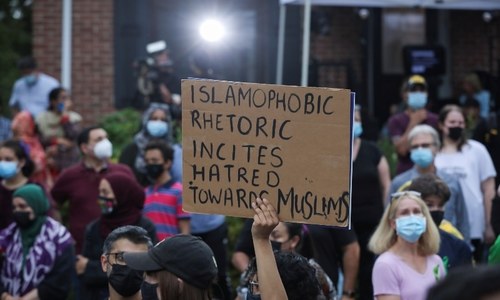THE brutal murder of a Pakistani-origin family in the city of London, Ontario, by 20-year-old Nathaniel Veltman caused a wave of outrage in Canada. Prime Minister Justin Trudeau openly condemned it as an act of terror and thousands rallied to pay respects to the slain members of the family and to pray for the health of nine-year old Fayez, the sole survivor of this hate crime. There is no doubt this was a genuine outpouring of revulsion at the crime, and of sympathy for those so brutally slain.
But beneath the surface is a miasma, the odour of which leaked out even during this time of tragedy.
Soon after the attack, a TikTok video was uploaded in which a man records three Muslim women walking down the road. As they stroll down the sidewalk, the man is heard saying: “Where’s Nathaniel Veltman when you need him?” Then a truck passes by and the man exclaims: “Buddy, you missed them. Back up,” before bursting into laughter.
In another video, a man named Craig Harrison said “he was surprised it [the attack] hasn’t happened sooner”, adding that “Canadians are rightfully getting upset about being out-populated in their own country by people from different cultures who don’t respect Western values”. Harrison, who has a criminal history that includes racially motivated attacks, was once the mayoral candidate for Georgetown, Ontario.
Anti-Muslim sentiments are on the rise.
The reference to being ‘out-populated’ is a popular theme in modern neo-Nazi and white supremacist thought, and revolves around the belief that white people are being ‘outbred’ by other races in the West, and that this is both part of and a precursor to what they call the ‘Great Replacement’. This was also the title of the manifesto published by Brenton Tarrant, the terrorist who massacred 51 worshippers at a Christchurch mosque in New Zealand in 2019.
As investigations continue, one question that will be asked is ‘where was Nathaniel Veltman radicalised?’ And one can safely surmise that perhaps more so than his immediate ‘real-world’ social circles, he was introduced to and indoctrinated by white supremacy online. That was the case with Alexander Bissonnette, who shot and killed six people at a Quebec City mosque in 2017, and was known to be a right-wing troll in online spaces.
How poisonous is this online discourse? In an analysis for the Globe and Mail, Amarnath Amarasingam and Jacob Davey write that in 2020 they examined close to 2,500 accounts, channels and groups on various social media platforms that disseminated extremist right-wing propaganda, producing “nearly four million pieces of individual content”, that were spread far and wide.
These groups, they concluded, were resistant to attempts to de-platform them and were incredibly resilient and determined in their effort to “drive hatred against minority communities and polarise Canadian society”.
More, despite their ideological differences, these groups converge on their shared hatred from immigrants, and in particular, their hate for Muslims. And they are increasing in both number and appeal.
Much like a plant needs suitable soil and conditions in order to be able to thrive, so too does the seed of hate need an enabling environment to be able to bloom into a bloody harvest. Across the Western world, we have seen a steady rise in right-wing ideology to the extent that many of the talking points of what was once the extremist fringe have become part of mainstream political discourse, which in turn legitimises the views of the (once) far right, bringing them closer to the centre and thus to wider acceptability. This, in turn, drives more and more people into their ranks, and by and large they avoid the label of ‘terrorist’ even when they carry out politically motivated attacks, simply because the diffused nature of the white supremacist movement means that individuals may not subscribe to, or be members of, specific organisations.
Canada is no exception; In Canada, as in much of the West, Muslims remain the most common target of online hate, outstripping any other group and the attacks are increasingly moving from online spaces to real life. This isn’t taking place in a vacuum: a 2020 report on Islamophobia in Canada submitted to the UN revealed that 46 per cent of Canadians have an ‘unfavourable’ view of Islam — more than for any other group. More than half of the people living in Ontario felt that Muslim doctrines ‘promote violence’ while 42pc of Canadians think that discrimination against Muslims is ‘mainly their fault’.
The report also points out the role of the media in creating this environment, noting that while negative stories about Muslims abound in Canadian media, attacks on Muslims receive relatively less coverage; the Quebec mosque shooting for “five minutes of airtime” on CBC the night it occurred while the 2017 London Borough attacks in the UK were covered for hours with live commentary. No wonder, then, that for too many Nathaniel Veltman is not someone to condemn, but to emulate.
The writer is a journalist.
Twitter: @zarrarkhuhro
Published in Dawn, June 21st, 2021















































